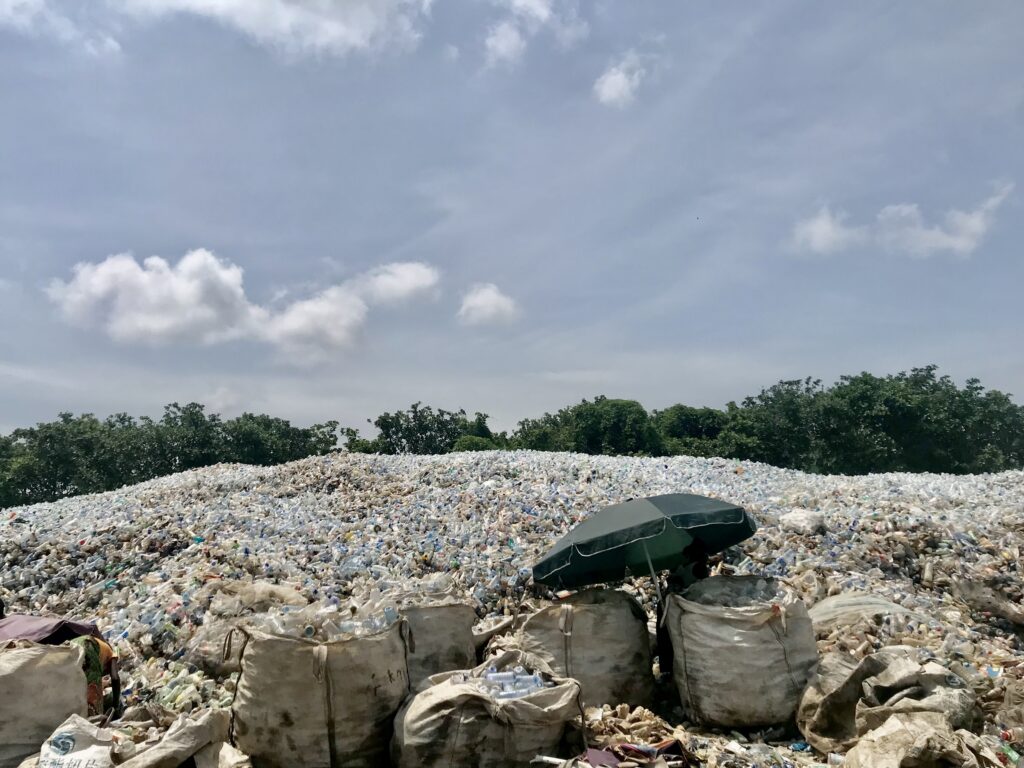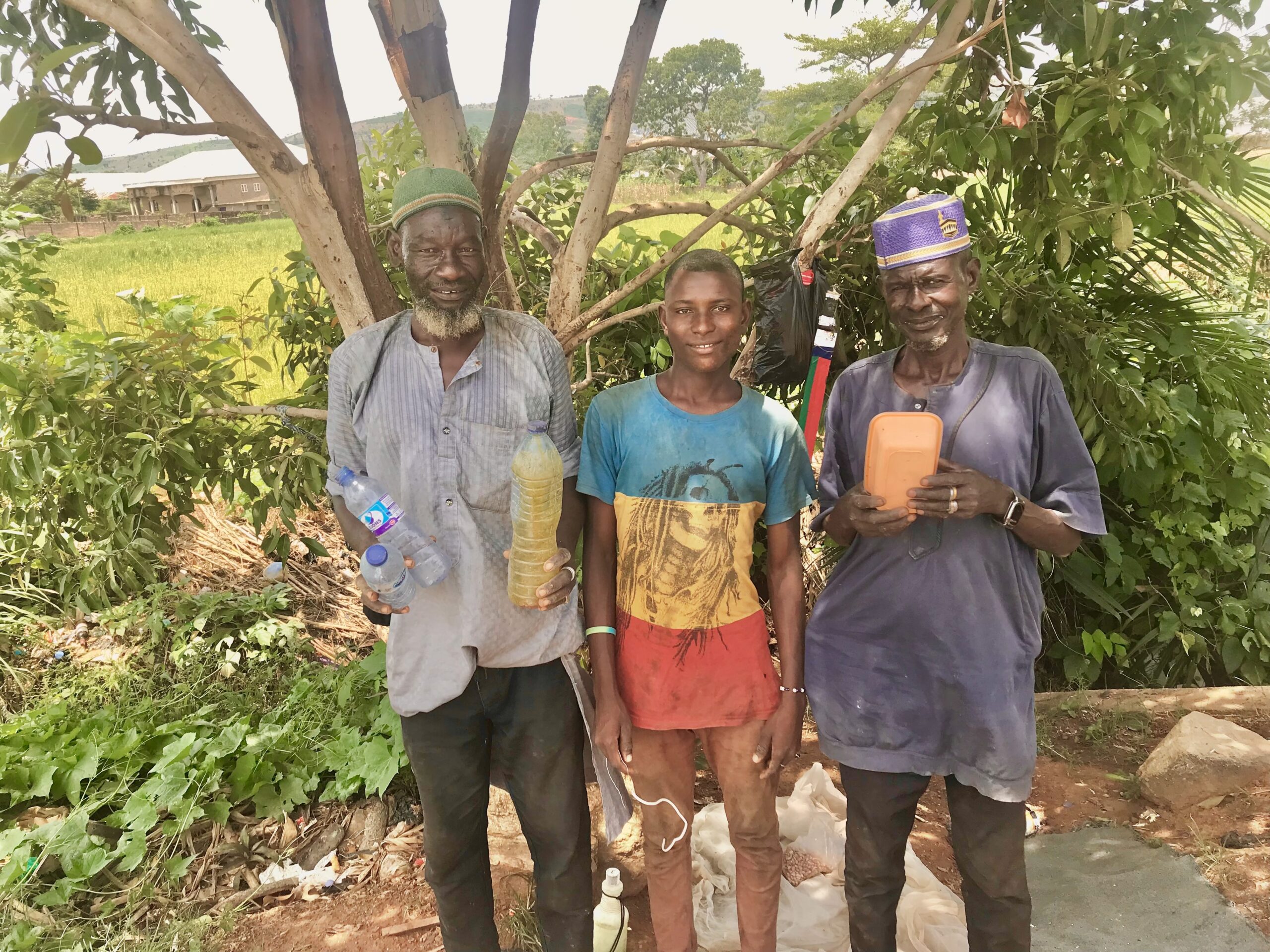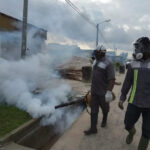In Kurudu, an outskirt community in Nigeria’s capital, Abuja, Bila Shugaba and Usama Jikandada combine environmental sustainability and economic survival. Every day, they trek through this community and other nearby ones, scouring for discarded plastics to collect.
They want to earn a modest income and contribute to a cleaner environment.
“We are struggling to feed ourselves and our families. Since we don’t intend to resort to criminal activities, my friend and I decided to start collecting and selling plastics to earn a modest income. It’s our daily routine,” explained Shugaba.
Jikandada added that their children often assist with this task to expedite the process.
“Our primary motivation is to earn income by selling the plastics we gather here. By doing this, we help prevent waste from obstructing the road, as the garbage bin is directly across from it,” Jikandada said.
Though small, the duo’s efforts are helpful in a country where plastic production has surged. With 2.3 million tonnes of primary plastics produced between 2009 and 2015, Nigeria ranks among the top three countries with high plastic production. Also, Nigeria imported an estimated 20 million tonnes of primary plastics and plastic products between 1996 and 2017, projected to reach 40 million tonnes by 2030.
While the use of plastic is fueled by its affordability and convenience, its impact on the environment is dire.
According to the United Nations Environment Programme or UNEP, the production, use, and disposal of plastics pollute ecosystems, pose risks to human health, and destabilise the climate. Approximately 11 million metric tonnes of plastic waste enter the ocean annually, harming marine life and aquatic habitats.
This issue is not limited to Nigeria; it is a global challenge. The world grapples with waste management, as evidenced by the United Nations report 2019, which indicates an increase in the global material footprint and a 38% growth in electronic waste. Without intervention, plastic flow into the ocean is expected to nearly triple by 2040 to 29 million metric tonnes per year, equivalent to 50 kg per meter of coastline worldwide.
A feeder to more effort
Shugaba and Jikandada’s efforts feed into a larger recycling ecosystem, notably a startup called Impulse Recycling Limited.
Impulse Recycling specialises in recycling Polyethylene terephthalate or PET plastics; the company has been operational since 2019, striving to divert waste from landfills and supply recycled materials to local and international manufacturers.
Clement Odide, the production officer at Impulse Recycling, said the organisation collects plastic waste from people like Shugaba and Jikandada, and then “we meticulously sort and categorise the plastics by colour. We then remove labels and transport them to our production area for crushing. After the crushing process, we pack the crushed plastics into bags, ready for pickup by manufacturers.”
He underscored the company’s crucial role in mitigating plastic pollution and stressed its positive economic impact, creating jobs and contributing to revenue through taxes.
“The consumption of plastic products in Nigeria is very high, and I believe that with a company like ours in Abuja, plastic pollution can be mitigated,” he added.

Odide mentioned that they also have plastic suppliers in various locations, including Kurudu, Jikwoyi, Karu, Nyanya, Mararaba, Masaka, Keffi, Orozo, Karshi, and others.
“We employ workers who handle sorting and label removal while others manage the crushing and finishing processes. We prioritise confidentiality regarding our employees and suppliers unless they consent to share information about themselves or discuss our operations,” he affirmed.
Furthermore, Odide explained that coloured plastics such as green, brown, and black are in lower demand compared to light-coloured ones like transparent blue and white, as the colour of the plastic cannot be altered. Hence, they are sorted separately before the crushing process.
So far, the company has “recycled over 1000+ tons of PET since our inception and aims to double our output in the coming year,” adding that their work has also allowed them to employ many.
Despite their role, suppliers like Jikandada and Shugaba said the compensation they receive for their work only gets them by. Still, they are nonetheless happy that the opportunity even exists.
“Our earnings are not substantial, but we strive to collect more plastics to increase our income. For instance, one kilogram of plastic bottles fetches 50 naira, and in a day, we aim to collect up to 20 kilograms. The company weighs the plastic and pays us accordingly,” said Jikandada.
Recognising the environmental dangers of plastic disposal and its escalating volume, companies like Impulse Recycling Limited are doing their part to preserve the environment and combat climate change. However, individuals and the government must explore all available avenues to reduce plastic pollution in the country.
In the meantime, individuals like Shugaba and Jikanda are simultaneously addressing environmental concerns and securing sustainable livelihoods by keeping their surroundings free of plastic pollution while earning an income.
In Kurudu, a community in Nigeria's capital, Abuja, Bila Shugaba and Usama Jikandada combine efforts in environmental sustainability and economic survival by collecting discarded plastics. They aim to earn a modest income while contributing to a cleaner environment. This initiative is supported by their families and enhances their ability to manage waste effectively.
Their work feeds into a larger recycling ecosystem, particularly supporting Impulse Recycling Limited, a startup specializing in recycling Polyethylene terephthalate (PET) plastics since 2019. Impulse Recycling collects, sorts, and processes plastics, supplying recycled materials to manufacturers and creating jobs in the process. The company emphasizes the environmental and economic impact of reducing plastic pollution, a significant issue in Nigeria, a top producer and importer of plastics.
Despite the modest earnings, Shugaba and Jikandada find value in their work through environmental preservation and income generation. Their efforts highlight the crucial role of individual actions and small enterprises in addressing the global challenge of plastic pollution and contribute to a larger goal of sustainable waste management.






